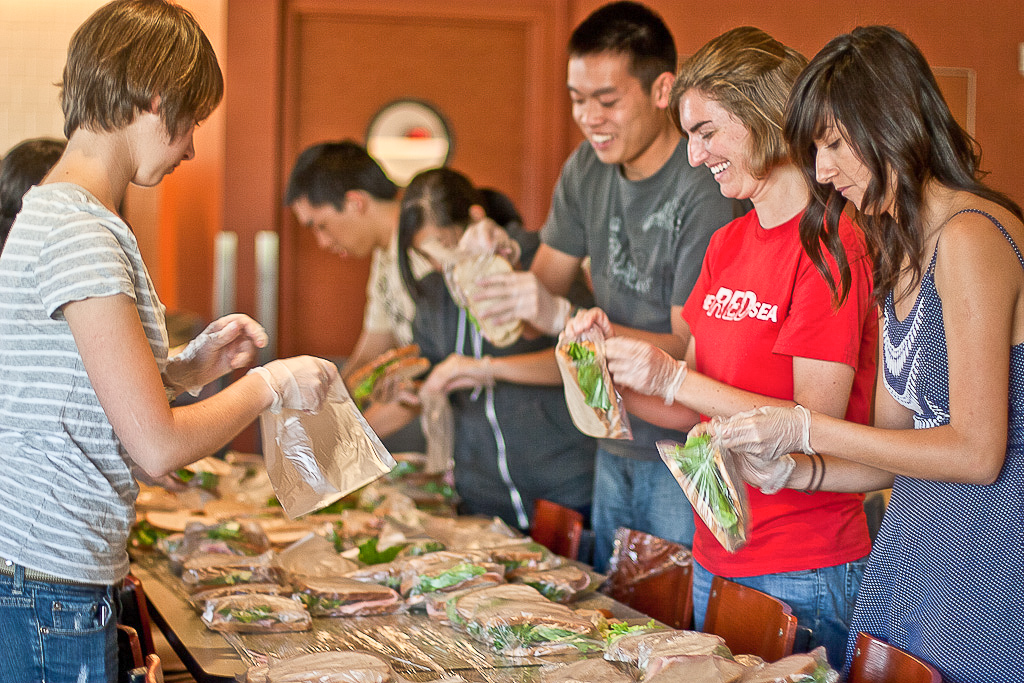
The Brown Bag Ministry serves the homeless and low income in Long Beach by going to a church every Thursday with 100-200 meals. | Laura Cook/THE CHIMES
Sitting in a worn-down basement having a conversation over a sack lunch with a homeless man was probably the last place that freshman nursing major Mary Cabrera and junior English major Reina Berumen thought they would be on a Thursday night. While most Biola students were enjoying the start of their weekend by hanging out with friends, the girls decided to join Brown Bag Ministry for the first time for the ministry’s weekly trip to First Friends Church of Long Beach, Calif. to pass out bagged lunches and have conversations with the homeless.
Legacy of building relationships
Brown Bag Ministry, which has been at Biola since 1998, seeks to serve the homeless and low-income community in Long Beach by showing up to the church each week with anywhere from 100 to 200 lunches — depending on the amount of meal plan donations they received that week from Biola students. The regulars expect the team every Thursday, waiting patiently in the church basement at 6 p.m. sharp to pick up a brown paper bag filled with what could be their first meal of the day.
Before this happens, the lunches must be packed. On Feb. 23, about a dozen volunteers gathered in the Caf, ready to construct sandwiches and fill paper bags with Doritos, cookies and oranges. The week of Feb. 20, students donated 112 meals. The number of meals prepared each week varies as new students offer their meals to the ministry. Within the hour, 112 brown bags were packed with food and loaded into car trunks, ready to be placed in the hands of the hungry.
The distribution of the food comes in three phases. First, the team goes to First Friends Church to pass out the bulk of the lunches. Next, they knock on doors at a nearby motel and hand out more, praying with the recipients in their doorways. Finally, they go next door to an apartment complex and play with the children who live there, bringing them any remaining meals.
“We don’t just give them a meal, tell them Jesus loves them and then get out of there,” said sophomore music education major Andy Peeler about the first phase. “We sit down with them, talk with them, and develop relationships.”
Meaningful fellowship with homeless
Since Brown Bag Ministry seeks to build strong friendships with those they serve, they cherish the time spent interacting with the homeless at First Friends Church. All across the dingy church basement, Biolans paired off with the homeless, the students’ crisp clothing in sharp contrast to the perpetually unwashed layers donned by the poor. The students listened intently as the homeless shared what had happened to them in the past week or told newcomers their stories, the contents of their brown bag meals strewn on the table in front of them.
The Biolans who come on a consistent basis have formed friendships with the homeless that have made an impact on their worldview.
“One of the reasons I go is to keep a perspective,” Peeler said. “Going down there reminds me that there’s pain, and the world’s life is not Biola. It’s not this campus. It’s kept my perspective on reality real.”
And although the prospect of engaging in conversation with the homeless may seem frightening, the team is confident that God works despite the students’ fears.
“It’s so neat to get to hear students talk about how [the ministry has] impacted them and how it’s changed their view of people and of how God can work, even when we don’t really know what to say,” said senior intercultural studies major Laura Dumas, who is the ministry’s logistical leader.
And according to senior computer science major Kevin Chin, the director of Brown Bag Ministry, a lot of the homeless already claim to be Christians. He explains that the homeless hear the gospel message multiple times per day, and although this is powerful and important, Brown Bag does ministry differently.
“We do it from a relational perspective,” Chin said. “We ask how they’re doing or how God is providing in their life, and their defenses come down.”
Changing set stereotypes
At the motel later that night, a father holding his tiny son is grateful when asked what he needs prayer for.
“The prayer y’all prayed for me last week was answered,” the man said. “I asked that I would get a job and my dream job called me yesterday!”
The team rejoices with him and prays for him once again, parting with hopes to see him next week. The man is not a Christian.
It is encounters like this that made Cabrera and Berumen’s first trip so enjoyable. They fellowshipped with a homeless man named Jim at the church, who spent the whole hour telling them about the Bible. Getting to hear his story changed the girls’ opinion of the homeless.
“I really liked talking to Jim because I feel like he has a totally different perspective on everything,” Cabrera said.
“If I were to see him out in the street, I would just judge him, as bad as that sounds,” Berumen said. “I’d never guess that he was so intellectual. I’m curious to know how he got in his situation, but …”
Cabrera joyfully finishes her sentence.
“But we’ll save that for next week!”







